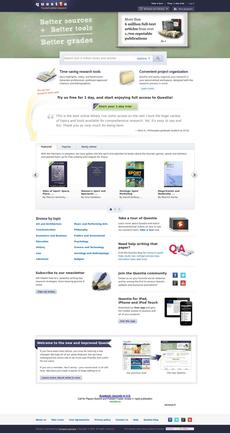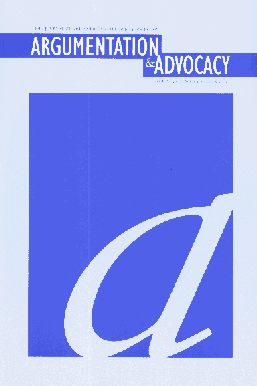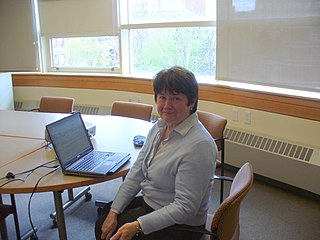
A librarian is a person who professionally works managing information. Librarians' common activities include providing access to information, conducting research, creating and managing information systems, creating, leading, and evaluating educational programs, and providing instruction on information literacy to users.
The Association of College and Research Libraries defines information literacy as a "set of integrated abilities encompassing the reflective discovery of information, the understanding of how information is produced and valued and the use of information in creating new knowledge and participating ethically in communities of learning". In the United Kingdom, the Chartered Institute of Library and Information Professionals' definition also makes reference to knowing both "when" and "why" information is needed.

Questia was an online commercial digital repository of books and articles that had an academic orientation, with a particular emphasis on books and journal articles in the humanities and social sciences. All the text in all the Questia books and articles were available to subscribers; the site also included integrated research tools. It was founded in 1998 and ceased operations in December 2020.

HeinOnline (HOL) is a commercial internet database service launched in 2000 by William S. Hein & Co., a Buffalo, New York publisher specializing in legal materials. The company was founded in Buffalo, New York, in 1961, and is currently based in nearby Getzville, New York. In 2013, WSH Co. was the 33rd largest private company in western New York, with revenues of around $33 million and more than seventy employees.
Michael Gorman is a British-born librarian, library scholar and editor/writer on library issues noted for his traditional views. During his tenure as president of the American Library Association (ALA), he was vocal in his opinions on a range of subjects, notably technology and education. He currently lives in the Chicago area with his wife, Anne Reuland, an academic administrator at Loyola University.

The following outline is provided as an overview of and topical guide to library and information science:
Library instruction, also called bibliographic instruction, user education and library orientation, is the process where librarians teach their patrons how to access information in libraries. It often involves instruction about research and organizational tools and methods. It prepares individuals to make immediate and lifelong use of information effectively by teaching the concepts and logic of information access and evaluation, and by fostering information independence and critical thinking. Above all they are aimed at equipping library users with skills to locate library sources and use them effectively to satisfy their information needs.

The Institute of Museum and Library Services (IMLS) is an independent agency of the United States federal government established in 1996. It is the main source of federal support for libraries and museums within the United States, having the mission to advance, support, and empower America’s museums, libraries, and related organizations through grantmaking, research, and policy development.” In fiscal year 2023, IMLS had a budget of $313.58 million. As of 2023, IMLS currently has 70 full-time employees, many of whom still work remotely. In 2022, the employees voted to unionize, joining hundreds of thousands of federal workers who have joined the American Federation of Government Employees (AFGE) to “build power and have a voice at work.”
Scholarly communication involves the creation, publication, dissemination and discovery of academic research, primarily in peer-reviewed journals and books. It is “the system through which research and other scholarly writings are created, evaluated for quality, disseminated to the scholarly community, and preserved for future use." This primarily involves the publication of peer-reviewed academic journals, books and conference papers.
College & Research Libraries is a bimonthly peer-reviewed academic journal published by the Association of College and Research Libraries.
Information activism at libraries and among librarians began in the 1960s, when many libraries advocated for the information rights of their clients. Their activism projects thereafter extended beyond library walls to advocate for issues such as tenancy and labour rights. With the advent of new information technologies and the information explosion of the late 20th century, information activism expanded in scope to include people who utilize information in the service of advocacy.

Argumentation and Advocacy is a quarterly peer-reviewed academic journal published by Taylor & Francis, edited by Beth Innocenti of University of Kansas. The journal was previously edited by Katherine Langford, Harry Weger, Catherine H. Palczewski, and John Fritch.

Mary Elizabeth Wood was an American librarian and missionary, best known for her work in promoting Western librarianship practices and programs in China. She is credited with the foundation of the first library school in China, the Boone Library School, as well as spurring the development of Chinese librarianship as a modern profession.
A pathfinder is a bibliography created to help begin research in a particular topic or subject area. Pathfinders are also called subject guides, topic guides, research guides, libguides, information portals, resource lists or study guides. Pathfinders produced by the Library of Congress are known as "tracer bullets". What is special about a pathfinder is that it only refers to the information in a specific location, i.e. the shelves of a local library.
The Association of Caribbean University, Research and Institutional Libraries (ACURIL) is a Caribbean library organization founded in 1969. It is based in the José M. Lázaro Library of the University of Puerto Rico.

Jeffrey Beall is an American librarian and library scientist who drew attention to "predatory open access publishing", a term he coined, and created Beall's list, a list of potentially predatory open-access publishers. He is a critic of the open access publishing movement and particularly how predatory publishers use the open access concept, and is known for his blog Scholarly Open Access. He has also written on this topic in The Charleston Advisor, in Nature, in Learned Publishing, and elsewhere.

Litwin Books, LLC is an academic publisher founded in 2006 under the name Library Juice Press. Library Juice Press became an imprint of the new parent company, Litwin Books, LLC in 2008. The Litwin Books imprint publishes books on archival studies topics, library history, communication studies, and related fields. The Library Juice Press imprint publishes books on library and information science topics, usually with an emphasis on critical theory or political aspects of the field. The company has its origins in an email news and comment distribution service called Library Juice, founded by Rory Litwin in 1998. In 2005, the Library Juice news service became a blog, which now supports the company's publishing projects and other activities. In an interview with Barbara Fister for Inside Higher Education Litwin, interested in the continuity of the knowledge base of librarianship, described the publisher's role as initiating projects and working collaboratively with authors. In 2016, Library Juice Press was awarded the Eli M. Oboler Memorial Award by the Intellectual Freedom Round Table of the American Library Association for its publication, The Library Juice Press Handbook of Intellectual Freedom: Cases, Concepts, and Theories.

Maureen Sullivan is an American librarian, educator, and organizational consultant who served as the president of the American Library Association from 2012 to 2013.
Fobazi Michelle Ettarh is an American academic. She has been librarian at Temple University Libraries, California State University, Dominguez Hills and Rutgers University. Her research focus includes inclusion, equity, and diversity in libraries, and her work led her to coin the term "vocational awe."
The Code4Lib Journal is a quarterly academic journal published by Code4Lib covering research on libraries and information technology. It was founded by the Code4Lib community in 2007. Code4Lib publishes under a US CC-BY licence. Code4Lib Journal is also open peer reviewed.









